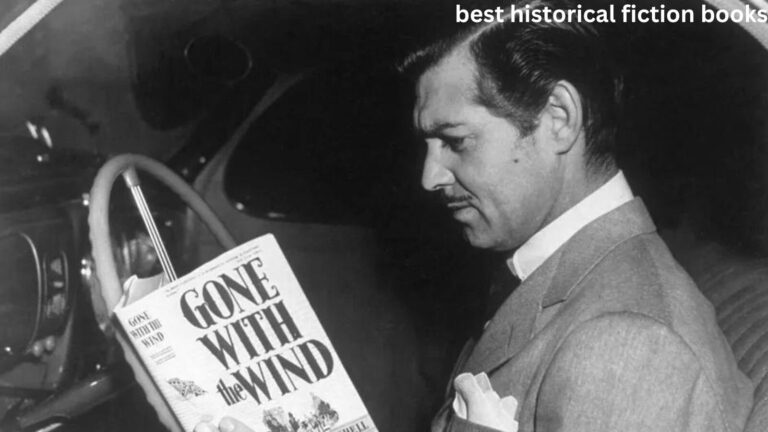Introduction
Readers of best historical fiction books transported to bygone eras and the pivotal events that molded our planet. Blending fact with imagination, these novels bring history to life via captivating characters. Anyone interested in the past or just enjoying a good yarn can find something new to love in historical fiction. Examining the works of the greatest historical fiction writers and the reasons for their enduring popularity, this article presents a selection of their finest works.
“All the Light We Cannot See” by Anthony Doerr
A blind French child and a German soldier’s lives are intricately entwined in “All the Light We Cannot See” by Anthony Doerr, set during World War II. The story offers a moving look at the resiliency of the human spirit while depicting the effects of war on regular people. The story is eerily lovely, thanks to Doerr’s lyrical writing and painstaking attention to detail. For individuals who like tales that stir up deeper feelings and contemplation, this book is a perfect pick.
“Beloved” by Toni Morrison
Toni Morrison’s “Beloved” is a haunting and powerful novel set in the aftermath of the American Civil War. The novel follows the life of Sethe, a former slave who is haunted by the ghost of her dead daughter. Morrison’s novel is a poignant exploration of the impact of slavery on individuals and communities, offering a deeply human perspective on a dark chapter in American history. “Beloved” is a masterful blend of history and fiction, making it a must-read for fans of the genre.
“The Book Thief” by Markus Zusak
best historical fiction books
Death tells the narrative of “best historical fiction books by Markus Zusak, set in Nazi Germany. This fresh point of view gives the story of Liesel Meminger, a girl who takes comfort in taking books and giving them to others, a disturbing new dimension. The narrative delves on topics like love, loss, and the impact of language. For fans of historical fiction, “The Book Thief” is an absolute must-read due to Zusak’s innovative storytelling and the profound emotional impact of the novel.
“Wolf Hall” by Hilary Mantel
By focusing on Thomas Cromwell’s biography, “Wolf Hall” by Hilary Mantel transports readers to the turbulent world of Tudor England. Mantel gives a new take on a famous historical character by presenting a nuanced and complicated depiction of Cromwell. It was a captivating read, thanks to the novel’s wealth of historical background and complex political intrigue.
“The Nightingale” by Kristin Hannah
“The Nightingale” by Kristin Hannah is a moving tale of two sisters in Nazi-occupied France that celebrates the strength and bravery of women in times of conflict. Readers are able to immerse themselves in the resistance movement and the struggles of survival through the novel’s dual narrative format. A profound and captivating book, “The Nightingale” is Hannah’s work because of its emotional depth and detailed descriptions. The perseverance of the human soul through hardship is celebrated in this book.
“The Pillars of the Earth” by Ken Follett
The building of a cathedral in 12th-century England sets the stage for a vast epic in “The Pillars of the Earth” by Ken Follett. As the narrative progresses, the aspirations and goals of a wide range of characters—from peasants to noblemen—are intertwined. Follett breathes life into the Middle Ages with her extensive research and painstaking attention to historical detail.
“The Underground Railroad” by Colson Whitehead
In “The Underground Railroad” by Colson Whitehead, the real conductors and engineers help fugitive slaves find their way to freedom by reimagining the historical system of safe houses and hidden passageways as a real railroad. Cora, the heroine of the book, goes on a terrifying adventure through many parallel timelines that reflect various eras in American history. The novel was awarded the Pulitzer Prize and the National Book Award by Whitehead for its innovative narrative and strong topics. A disturbing and illuminating look into American history, “The Underground Railroad” is sure to make you think.
“Outlander” by Diana Gabaldon
“Outlander” by Diana Gabaldon combines factual accounts with fantastical elements to tell the tale of Claire Randall, a nurse during World War II who is for some reason whisked away to Scotland in the Carlos Ruiz Zafón’s “The Shadow of the Wind” is a beautifully crafted tale set in post-World War II Barcelona. The novel follows the life of Daniel Sempere, a young boy who discovers a mysterious book in the Cemetery of Forgotten Books. As Daniel delves deeper into the book’s history, he uncovers a dark and twisted tale that mirrors his own life. Zafón’s novel is a rich and atmospheric exploration of the power of literature and the impact of the past on the present. “The Shadow of the Wind” is a captivating and haunting read, making it a must-read for fans of historical fiction.
“Memoirs of a Geisha” by Arthur Golden
The “Outlander” series has become a worldwide sensation thanks to Gabaldon’s painstaking research into historical events and her captivating love stories. From beginning to end, readers are engrossed in the story because of its vivid locales, interesting characters, and exciting narrative twists. “Outlander” is a must-read for history buffs, romance novels, and action fans alike.
Arthur Golden’s “Memoirs of a Geisha”
“Memoirs of a Geisha” by Arthur Golden provides an intriguing window into the shrouded and mysterious world of pre- and post-war Japan’s geishas. Narrated from Sayuri’s point of view, the story follows a young girl named Sayuri as she grows up to become a legendary geisha in Japan. The beautiful words and vivid descriptions by Golden transport the reader into the story. A fascinating tale of ambition, perseverance, and the complexities of women’s life in a rapidly evolving society, “Memoirs of a Geisha” will captivate readers.
“Atonement” by Ian McEwan
An emotionally wrenching look at remorse, atonement, and the fallout from one miscommunication, “Atonement” by Ian McEwan is a must-read. Three characters’ lives are tragically and irrevocably changed by a single sad incident in this story set during World War One of the key elements that make historical fiction so engaging is its setting. The setting is not just a backdrop for the story but an active component that shapes the narrative. A well-crafted setting can transport readers to a distant past, whether it’s the bustling streets of Ancient Rome or the eerie corridors of a medieval castle. Consider, for instance, the ancient world depicted in “The Eagle of the Ninth” by Rosemary Sutcliff, where the Roman Empire’s vastness and the rugged British landscape are brought to life. The setting helps groun
“Beloved” by Toni Morrison
Morrison’s use of vivid images and lyrical words makes for an emotionally charged read. “Beloved” delves deeply on themes of identity crisis, trauma, and memory. The lasting impact of historical fiction is demonstrated by Morrison’s work, which is considered a cornerstone of American literature.
“The Name of the Rose” by Umberto Eco
“Atonement” is an intense and contemplative read because of McEwan’s superb storytelling and fully realized characters. Long after the last page has been turned, readers will still be thinking about the novel’s themes of remembrance and forgiveness.. Brother William of Baskerville investigates a string of murders at the abbey in this book. .
“All the Light We Cannot See” by Anthony Doerr
Anthony Doerr’s Pulitzer Prize-winning novel, “All the Light We Cannot See,” is a beautifully crafted story set during World War . The narrative alternates between two characters: Marie-Laure, a blind French girl, and Werner, a German soldier. Their lives intersect in occupied France, where they are both caught in the turmoil of war. Doerr’s lyrical prose and meticulous attention to historical detail make this novel a standout in the genre.
Conclusion
By fusing fact and fiction, the best historical fiction books provide a fresh perspective on the past through captivating stories. Any reader interested in romance, history, or conflict will find something to their liking in historical fiction.

